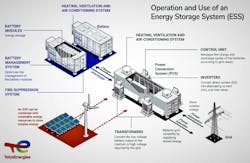TotalEnergies plans battery energy storage farm at Antwerp refining complex
TotalEnergies SE is collocating what will become Belgium’s first battery-based energy storage system (BESS) at the operator’s 338,000-b/d integrated refining and petrochemical platform near the Port of Antwerp in the Antwerp-Rotterdam-Amsterdam (ARA) multi-port refining, trading, and storage hub.
Launched as part of a portfolio of activities in renewables and electricity to support TotalEnergies’ ambition to achieve net zero by 2050 and help meet challenges of balancing electricity grids, the proposed 25-Mw Antwerp BESS will consist of 40 Intensium Max High Energy lithium-ion containers supplied by subsidiary Saft Group SA that have a total storage capacity of 75 Mw-hr, equivalent to the daily consumption of nearly 10,000 households, the operator said on May 15.
Scheduled to be operational by yearend 2024, TotalEnergies said the Antwerp BESS specifically will help meet European and Belgian high-voltage transmission network needs 24 hr/day, 7 days/week by smoothing daily power fluctuations in the national grid, especially during peak winter periods, and guaranteeing grid security by actively contributing to the national grid's reserve services.
The proposed Antwerp industrial-scale stationary energy storage project also will enable more renewable electricity to be integrated into the Belgian and broader European grids to help ensure their stability, according to the operator.
Selected for collocation at the Antwerp platform to benefit from the site’s available land and its grid connection, the planned storage project forms a new step in TotalEnergies' development of BESSs, which aims to strengthen the company's presence across the entire electricity value chain—including production, storage, and supply—in Belgium, the operator said.
Because they can be deployed quickly, have a limited footprint, and high reactivity, batteries effectively respond to the growing need for grid balancing and are essential to supporting greater development of renewable energies by compensating for the intermittency introduced by these energies, TotalEnergies said.
As part of its multi-energy strategy, TotalEnergies intends to continue deploying energy storage solutions, notably in countries where it is actively developing renewable energies, said Olivier Jouny, the operator’s senior vice-president of integrated power.
After commissioning four battery parks in France offering a total energy storage capacity of 130 Mw-hr, the Antwerp project, upon completion, is slated to become TotalEnergies’ largest BESS in Europe.
As part of a contract award from the French Electricity Transmission Network (RTE) seeking to add battery storage capacities in France, TotalEnergies fully commissioned the country’s largest BESS in late 2021 on one of its former industrial sites at the Flanders center in Dunkirk, which—consisting of 27 containers of 2.5 Mw-hr designed and assembled by Saft—responds to the need for French grid stabilization with a power capacity of 61 Mw and a total storage capacity of 61 Mw-hr, the operator confirmed in a Dec. 21, 2021, release.
BESS overview
In a spring 2023 shareholders’ newsletter published May 5, TotalEnergies said the core advantage of BESSs is their capacity to rapidly breach and control gaps that can occur at any time between consumer demand and producers’ connected capacities. Controlled by the grid operators, the storage systems can help prevent blackouts by ensuring the grid can continue to operate during such gaps (see accompanying diagram).
Beyond their role as a stabilizer, in regions where the share of renewable energies is high, batteries—when renewables production levels are higher than consumption—can store surplus solar and wind power at lower costs and redistribute it during periods of high demand, thereby optimizing the use of all available power, according to the operator.
In addition to France, TotalEnergies said subsidiary Saft has several projects under development or construction in other countries, including 450 Mw in the US and 300 Mw in Europe (Belgium, the Netherlands, and Spain).
With other unidentified opportunities still under investigation, the operator said it aims to install 5 Gw of BESS installed power by 2030.
TotalEnergies said Saft currently has a total of 1 Gw/2 Gw-hr of BESS-related capacity in operation and construction in the US, Europe, Australia, and Chile.
About the Author
Robert Brelsford
Downstream Editor
Robert Brelsford joined Oil & Gas Journal in October 2013 as downstream technology editor after 8 years as a crude oil price and news reporter on spot crude transactions at the US Gulf Coast, West Coast, Canadian, and Latin American markets. He holds a BA (2000) in English from Rice University and an MS (2003) in education and social policy from Northwestern University.


